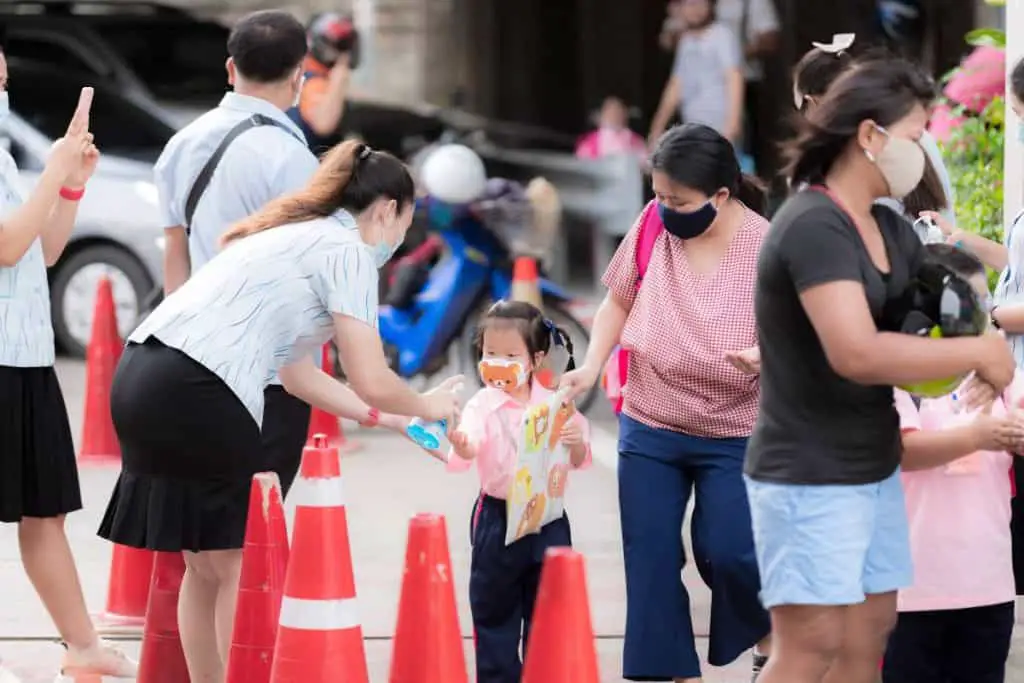The Best Cultural Tips For Teachers In Thailand
Are you considering packing your bags and moving to the Land of Smiles to teach English? Thailand offers teachers an unbeatable combination of fascinating cultural experiences, outdoor adventures, and professional opportunities. With glistening beaches, spicy cuisine, and welcoming locals, Thailand has become hugely popular for expatriate English teachers.
However, every country has its own set of cultural norms and expectations. As a foreign teacher coming to Thailand, you’ll need to spend some time understanding local customs and etiquette. While the Thai people are incredibly friendly and hospitable, following some basic cultural guidelines will help you avoid awkward moments!
From giving the traditional wai greeting to knowing appropriate attire, this article outlines key tips to help you thrive as a teacher in Thailand. Consider this your crash course in Thai cultural awareness!
Key Takeaways
- Respect cultural norms like greetings, clothing expectations, and etiquette regarding the Thai royal family and religion
- Build relationships with Thai colleagues to better understand the school system and academic calendar
- Get comfortable navigating day-to-day life in Thailand by learning some basic Thai, taking local transportation, and indulging in incredible cuisine
Welcome to Thailand: Cultural Tips for Teachers
Key Cultural Differences to Know Before Arriving
Before your teaching adventure begins, it’s important to understand key aspects of Thai culture so you can properly prepare. Let’s review some cultural differences to expect when you touchdown in Thailand:
Greetings and Gestures
When visiting Thailand, it is important to be aware of some cultural norms around greetings and gestures to avoid accidentally offending anyone. The wai, made by placing the palms together prayer-style, is the standard Thai greeting used when meeting someone and saying goodbye. Make sure to wait when you interact with locals.
You’ll also want to be conscious of how you use your feet. Pointing your foot at someone or pointing with your foot is considered very impolite. Additionally, touching someone’s head is frowned upon since the head is seen as the most sacred part of the body.
As you navigate interactions during your travels, keep in mind that Thai culture generally avoids public displays of strong emotions like affection, anger, or sadness. Doing your best to maintain composure in emotional situations will be appreciated.
Following these tips will help you engage in positive exchanges with the friendly Thai people you meet on your journey.
Clothing Expectations
When packing for your teaching position in Thailand, it’s important to be thoughtful about clothing choices that respect local cultural norms. Schools tend to prefer modest, conservative attire – you’ll want to cover your shoulders and knees out of consideration.
Before your first day, ask the school administration about any specific dress code details. Some schools have teachers wear shirts following a color scheme based on the day of the week, so you’ll want to check if such a policy is in place.
Remember to pack clothes that completely cover your shoulders and legs for visiting Thailand’s gorgeous temples – removing your shoes at the entrances of these sacred spaces is customary as well. By being aware of local preferences around attire, you’ll be sure to make a positive impression at your new school. The Thai people will appreciate your efforts to dress respectfully.
Religion and the Monarchy
- Around 95% of Thais follow Buddhism, which is beyond respected here. Avoid being dismissive of any religion.
- Speaking negatively about the royal family is punishable under the law. Don’t bring it up in class.
- Stand still and quiet when you hear the royal anthem played publicly.

Navigating the School System
Once you’ve gotten a teaching job and received your work visa in Thailand, it’s time to dive into the school system! Here are some pointers on understanding Thai academic standards:
Understanding the Academic Calendar
As you prepare for your teaching opportunity in Thailand, you’ll want to familiarize yourself with some key aspects of the academic calendar that differ from what you may be used to.
The Thai school year lasts from May and runs until March, with long breaks for students in October/November and March/April. Keep in mind that midterm exams happen every September, so you can anticipate mid-August marking an intense period of review and preparation.
As a foreign teacher, hiring timelines mean that you can expect to start searching for open positions a month or two before the next academic year kicks off in May. Knowing this structure ahead of time will ensure that your experience aligns smoothly with the local schedule and expectations.
Even though some of these details may contrast with the school system back home, being aware of the unique rhythm in Thailand will set you up for an engaging and successful year.
Building Relationships with Thai Colleagues
Don’t underestimate the power of building strong connections with Thai administrators and teachers at your school.
- Seek out a mentor teacher who can explain school processes and cultural intricacies.
- Exchange language skills – offer to help staff practice English in exchange for basic Thai lessons!
- Socialize respectfully with colleagues during school events, holidays, and gatherings.
Life Inside the Classroom
Now comes the fun part – teaching students! Here are some key techniques for running an engaging classroom in Thailand:
Managing Student Behavior
- Establish clear classroom rules early on. Involve students by co-creating the rule list.
- Use positive reinforcement. Call out good behavior more than scolding.
- Don’t lose your cool! Handle disruptions calmly. Ask a disruptive student to speak 1-on-1 after class.
Respecting Cultural Norms
- Avoid standing with feet facing a Buddha image or statue.
- If students are expected to sit on the ground, check for sharp objects on the floor first.
- Tread lightly discussing religion or the royal family, which are sacred here.
Surviving Day-to-Day Life
When you need a break from the classroom, Thailand delights all the senses. Immerse yourself in the culture. But don’t forget to mind these basic customs:
Language Barriers
- Learn a few polite Thai phrases like hello, thank you, how much is this, where is the bathroom, etc.
- Downloading a translation app on your phone can be a huge help.
- Carry a translation booklet of common allergy-related food vocabulary if dietary restrictions. Point to it at restaurants!
Traffic and Transportation
- Use Grab, Bolt, or local taxi apps to get around. Agree on a price before getting into any taxi.
- Avoid driving a motorbike without an international license. Thailand roads and traffic take getting used to!
- Female teachers should sit in the back seat of taxis/tuk-tuks to respect social norms.
Experiencing Thai Cuisine
Experiencing Thailand’s incredible food is an essential part of your visit! You’ll definitely want to indulge in the country’s world-famous dishes like pad thai noodles, flavor-packed green curries, and the hot and sour tom yum soup.
Just take note that many signature sauces and curries are made using fish oil, so be sure to ask to clarify which dishes are vegetarian if that’s important to you. Another head up – dishes marked as mild, medium hot, or Thai hot follow a much spicier scale than what you may be used to back home. Adventurous foodies should sample unique tropical fruits like durian, mangosteen, dragonfruit, and rambutan.
Even though some funky-looking fare may seem unfamiliar at first, an open mind and appetite will be rewarded with an explosion of new flavors. Let your Thai hosts guide your culinary journey – lean into recommendations!
Making the Most of Your Experience
Aside from imparting wisdom in the classroom, be sure to take some time to immerse yourself in Thailand’s awe-inspiring culture:
Immersing Yourself
- Attend a local temple fair or festival – it’s a swirling assault on your senses!
- Enroll in Thai language classes or cooking classes to befriend locals with similar interests.
- Wake up early to give alms to monks during morning tak bat. See the Buddhist devotion firsthand.
Traveling the Country
- With convenient buses, trains, and budget flights, Thailand is perfect for weekend visa runs!
- No Thailand experience is complete without beach time! Head south for swimming and snorkeling.
- Venture up north to Chiang Mai and Chiang Rai for outdoor adventures, beautiful temples, and hill tribe villages.
I hope this guide has illuminated some of the key cultural differences, etiquette pointers, classroom considerations, and survival essentials for teachers embarking on their Thai journey! If you have any other questions about visas, salaries, qualifications, hiring peaks, best destinations for teachers, or anything else Thailand-related, don’t hesitate to schedule a consultation call with me or join one of BetterLivingAsia’s monthly webinars for aspiring expats. Wishing you a magical experience teaching in Thailand! Sa-wat-dee kaa!

FAQs
What is the average salary for foreign teachers?
Most foreign English teachers in Thailand earn between 30,000 – 45,000 THB per month, which equates to roughly $1000 – $1500. This allows a comfortable lifestyle with a relatively low cost of living. International schools pay higher salaries.
Do I need to learn Thai before moving there?
Not at all! You can easily get by in Thailand without speaking Thai since English is widely used in cities and tourism areas. However, learning some basic Thai phrases will help you make local connections and show respect for the culture. Consider taking beginner Thai classes once you arrive.
How much does it cost to live comfortably?
Expect to budget around 15,000 – 25,000 THB / $500-USD 800 per month in Thailand as a single teacher for rent, food, transportation, and entertainment. Shared housing brings costs down. Plan to spend more in Bangkok or beach areas. With the teacher salary range, you can live well.
Is Thailand safe for foreign teachers?
Absolutely! Thailand is extremely safe for expats, especially in the main expatriate hubs like Bangkok, Chiang Mai, and beach towns. Violent crime is rare. As anywhere, just take normal safety precautions and avoid confrontations. Thailand warmly welcomes foreign teachers.
Are there any particular cultural differences in Thai schools that teachers should be aware of?
Yes, teachers should be aware of cultural differences such as the removal of shoes before entering certain areas, showing respect to senior staff and administrators, and understanding the significance of specific days of the week within the Thai culture.
How can teachers ensure they are respectful and considerate of the Thai culture while teaching in Thailand?
Teachers can ensure they are respectful and considerate by learning about Thai customs and traditions, seeking guidance from Thai friends or colleagues, and being mindful of their actions to avoid unintentionally offending others.
Conclusion
If you found this guide helpful but still have hesitations about moving to Thailand as a teacher, subscribe to the free BetterLivingAsia newsletter for more tips, resources, and advice from founder Tom Kitti. With over 35 years living in Asia since relocating from California, Tom shares weekly insights to prepare expats for living abroad.
Simply enter your email address below to join the BetterLivingAsia community. Start receiving Tom’s trusted guidance for your teaching abroad journey! Message us after subscribing if you have any specific questions.






